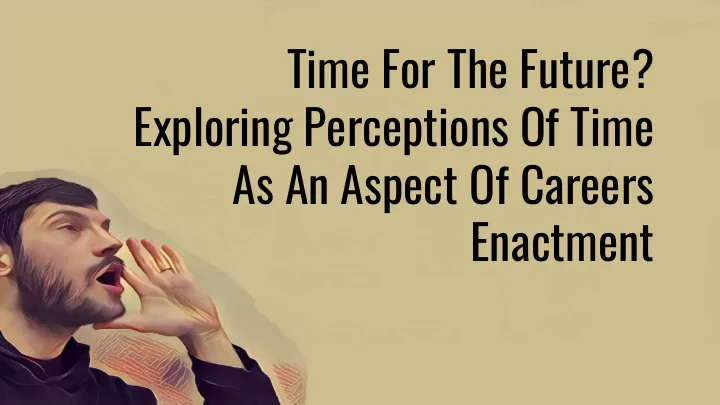

Time For The Future? Exploring Perceptions Of Time As An Aspect Of Careers Enactment
Overview ● Career Enactment ● Timescapes ● Reflexivity ● Career Readiness ● Careers work and time
Career Enactment “ [Barley (1989)]...locates career at the nexus of individuals and social structures. He suggests that people navigate through the contexts in which they are situated through their career thinking and enactment , drawing on career scripts ‘interpretive schemes, resources and norms for fashioning a course through the social world’” (Barley 1989, p.53 quoted in Cohen 1997, p.166)
“Timescapes” Barbara Adams (1990) ● Timescape brings together clock time with how we understand and experience time ● Includes how we understand past and future ● Includes experience of pace and momentum ● Includes how we see time as a resource
Reflexivity in late modernity ● Kant - What is the enlightenment? “Sapere aude” - dare to think ● Giddens (1991) - What is modernity? the reflexive self and risk society
Reflexivity and complexity in neoliberalism Eagleton-Pierce (2016) on individualism in neoliberalism ○ Central role of choice in neoliberalism ○ Choice is viewed ideally as rational and self-interested ○ Appeals to concepts of independence and freedom “the rhetoric associated with neoliberalism has notable appeals to individualised responsibility – the logic of self-governance and self-care in a market society.”
Reflexivity and complexity in neoliberalism Jodi Dean (2013) “Complexity’s tagging of the multiplicity of interrelated and unpredictable effects presents us as so deeply enmeshed in our situations that we can’t assess them; we can only react, and just in time , in a 24/7 ever faster market. But notice: at this point, the excuses—we can’t predict what will happen, we can’t know—turn back in on their reflexive partner: we are compelled to react, not reflect, even as we are enjoined to think more , think more thoroughly, consider all the options
Reflexivity and complexity in neoliberalism ● Individuals are increasingly seen as responsible for their own choices and actions ● But this form of thought is increasingly less reflective and more reactive ● Perceptions of the speed and complexity of modern life govern this ● Speed increasingly interacts with norms of thought ● Career Readiness is an example of this...
Career Readiness Anthony Giddens (1991) “Risk concerns future happenings - as related to present practices - and the colonising of the future therefore opens up new settings of risk…” ● Fear of not managing the future colonises and controls our present ● E.g. Career Readiness
Career Readiness “A career-ready person effectively navigates pathways that connect education and employment to achieve a fulfilling, financially-secure and successful career. A career is more than just a job. Career readiness has no defined endpoint. To be career ready in our ever-changing global economy requires adaptability and a commitment to lifelong learning, along with mastery of key knowledge, skills and dispositions that vary from one career to another and change over time as a person progresses along a developmental continuum.” - Career Technical Education (CTE)
Career Readiness Examples of readiness type theories: ● Bright and Pryor (2011) - Chaos Theory of Careers ● Krumboltz and Levin (2010) - Planned Happenstance ● Savickas (1997) - Career Adaptability E.g. Planned Happenstance - curiosity, persistence, flexibility and optimism ● Focus on acceleration, complexity, reaction, preparedness and individual autonomy
Careers work and time ● Uses the future as an engagement strategy ● Uses concepts of readiness and reaction ● Often looks at transition and progress as main rationals ● Emphasised in educational/ welfare structures that look like machines
Career & Time Creates norms around… ● Flexibility and adaptability ● Resilience ● Engagement and responsibility ● Asking “How can I be ready?” Excludes... ● Time wasting ● “Snow flakes” ● Asking “ What is this? What does it mean?”
Careers work and time - criticism ● Ignores inequalities in timescapes (Burke et al. 2017) ● Thinks of thought just as strategy and reaction not as construction and critique (e.g. understanding what career and related concepts are currently constructed as and what they could be). Alternatives ● Focus more on understanding and contesting career ● Talk about time differently with clients ● Focus more on being and less on becoming
References Adam B (1990) Time and social theory. Cambridge: Polity. Cochran, L. (1997). Career counseling: A narrative approach. Sage publications. Barley, S. R. (1989). Careers, identities, and institutions: The legacy of the Chicago School of Sociology. Handbook of career theory, 41, 65. Burke, P. J., Bennet, A., Bunn, M., Stevenson, J. and Clegg, S. (2017). It’s About Time: working towards more equitable understandings of the impact of time for students in higher education. Project Report. Australia, Curtin University. Dean, J. (2013). Complexity as Capture-Neoliberalism and the Loop of Drive. new formations: a journal of culture/theory/politics, 80(80), 138-154. Eagleton-Pierce, M. (2016). On individualism in the neoliberal period. In PSA 66th Annual International Conference (pp. 21-23). Krumboltz, J. D., & Levin, A. S. (2010). Luck is no accident: Making the most of happenstance in your life and career. Impact Publishers. Pryor, R., & Bright, J. (2011). The chaos theory of careers: A new perspective on working in the twenty-first century. Taylor & Francis. Savickas, M. L. (1997). Career adaptability: An integrative construct for life ‐ span, life ‐ space theory. The career development quarterly, 45(3), 247-259.
References Giddens, A. (1991). Modernity and self-identity: Self and society in the late modern age. Stanford university press: Chicago. Krumboltz, J. D., & Levin, A. S. (2010). Luck is no accident: Making the most of happenstance in your life and career. Impact Publishers. Pryor, R., & Bright, J. (2011). The chaos theory of careers: A new perspective on working in the twenty-first century. Taylor & Francis. Savickas, M. L. (1997). Career adaptability: An integrative construct for life ‐ span, life ‐ space theory. The career development quarterly, 45(3), 247-259.
Recommend
More recommend